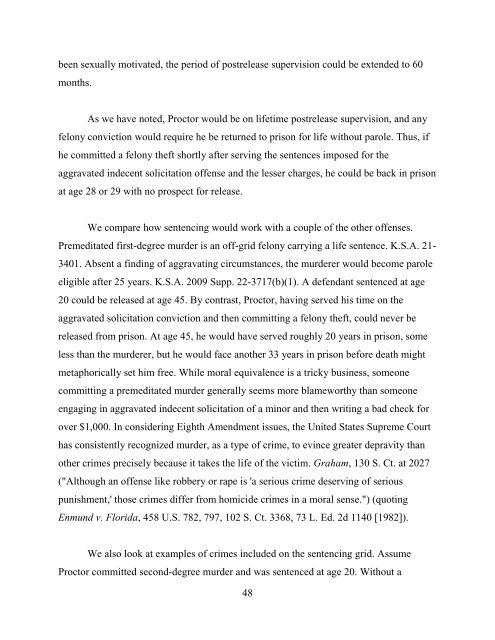State v. Proctor - Kansas Judicial Branch
State v. Proctor - Kansas Judicial Branch
State v. Proctor - Kansas Judicial Branch
Create successful ePaper yourself
Turn your PDF publications into a flip-book with our unique Google optimized e-Paper software.
een sexually motivated, the period of postrelease supervision could be extended to 60<br />
months.<br />
As we have noted, <strong>Proctor</strong> would be on lifetime postrelease supervision, and any<br />
felony conviction would require he be returned to prison for life without parole. Thus, if<br />
he committed a felony theft shortly after serving the sentences imposed for the<br />
aggravated indecent solicitation offense and the lesser charges, he could be back in prison<br />
at age 28 or 29 with no prospect for release.<br />
We compare how sentencing would work with a couple of the other offenses.<br />
Premeditated first-degree murder is an off-grid felony carrying a life sentence. K.S.A. 21-<br />
3401. Absent a finding of aggravating circumstances, the murderer would become parole<br />
eligible after 25 years. K.S.A. 2009 Supp. 22-3717(b)(1). A defendant sentenced at age<br />
20 could be released at age 45. By contrast, <strong>Proctor</strong>, having served his time on the<br />
aggravated solicitation conviction and then committing a felony theft, could never be<br />
released from prison. At age 45, he would have served roughly 20 years in prison, some<br />
less than the murderer, but he would face another 33 years in prison before death might<br />
metaphorically set him free. While moral equivalence is a tricky business, someone<br />
committing a premeditated murder generally seems more blameworthy than someone<br />
engaging in aggravated indecent solicitation of a minor and then writing a bad check for<br />
over $1,000. In considering Eighth Amendment issues, the United <strong>State</strong>s Supreme Court<br />
has consistently recognized murder, as a type of crime, to evince greater depravity than<br />
other crimes precisely because it takes the life of the victim. Graham, 130 S. Ct. at 2027<br />
("Although an offense like robbery or rape is 'a serious crime deserving of serious<br />
punishment,' those crimes differ from homicide crimes in a moral sense.") (quoting<br />
Enmund v. Florida, 458 U.S. 782, 797, 102 S. Ct. 3368, 73 L. Ed. 2d 1140 [1982]).<br />
We also look at examples of crimes included on the sentencing grid. Assume<br />
<strong>Proctor</strong> committed second-degree murder and was sentenced at age 20. Without a<br />
48

















